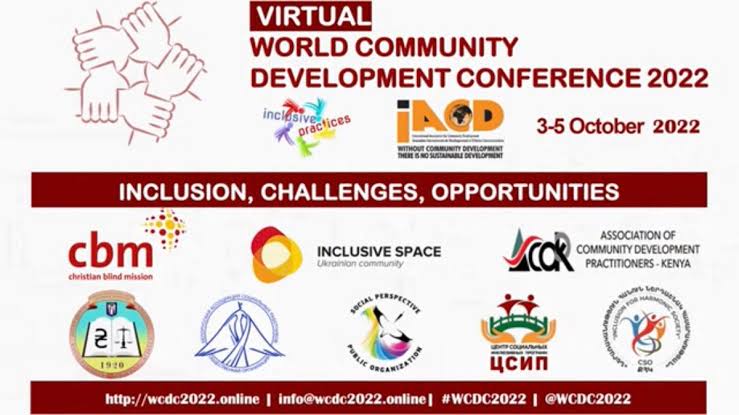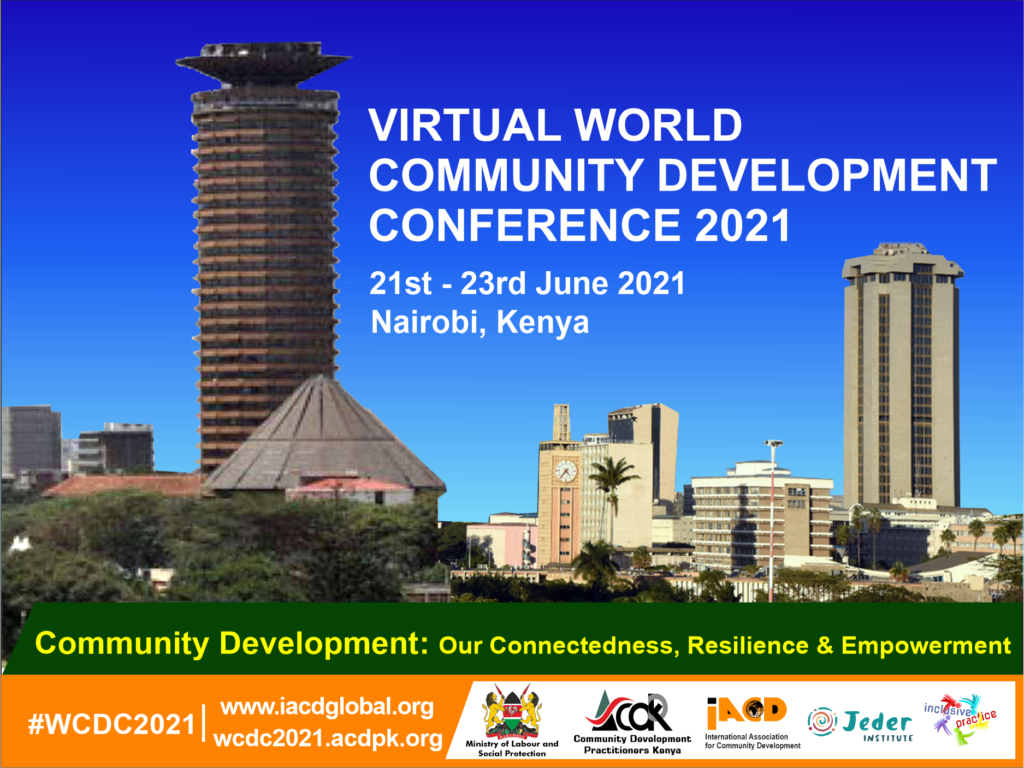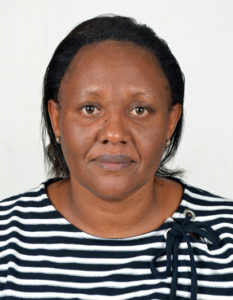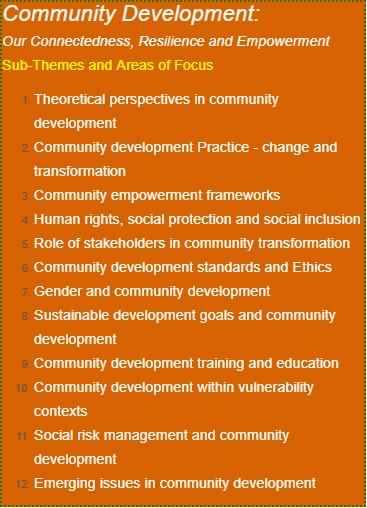Since 2018 IACD, together with national partners has organised the World Community Development Conference. This is a global gathering of members and other participants organised to network, share and learn from community development practice from different countries and across global regions. Each WCDC has a theme related to a topical political, social, economic, environmental issue affecting communities and of concern to the discipline and practice of community development.
Attracting several hundred participants, these gatherings bring together keynote speakers, panel debates and dozens of workshops and practical learning sessions, presented by practitioners, educators and researchers and key influencers within the discipline.
Each WCDC also provides opportunities to visit local projects in proximity. Following the conference an extended Practice Exchange visit of 3/4 days may also be organised for a smaller group of participants wishing to learn more about community development in the host country.
All WCDC’s are organised with host partners, normally a national community development association or agency, and supported by the host local authority and national government.
IACD 2022 Virtual World Community Development Conference Ureki, Georgia 3-5 October 2022

The first Virtual World Community Conference 2021 (WCDC2021) held from Nairobi, Kenya (June 2021, see below), set the stage for Virtual WCDC2022 which was subsequently held from Ureki, Georgia in October 2022. So as to ensure continuous learning and interaction with the wealth of community development knowledge and skills born out of learning, practice as well as lived experiences, the proceedings were recorded and are now archived under a dedicated YouTube Virtual WCDC link:
https://www.youtube.com/c/VirtualWCDC
Welcome and let us continue the connection and learning!
Conference Program
Book of Abstracts
Our 2021 World Community Development Conference is our first ever completely virtual conference!

Our Connectedness, Resilience, and Empowerment
WCDC2021 will be a celebration of community development – a discipline and practice that seeks to nurture the enduring community spirit that holds communities together.
It is a fact that community life occurs within contexts that are promotive of healthy communities but equally that also have shocks and uncertainties which pose a challenge to meeting even the basics of live including hope. Yet communities through their enduring connectedness are constantly engaged in efforts to bounce back, and indeed, often do bounce back in spite of the adversities within vulnerable contexts– largely because of drawing from the wide range of resources and assets from within and without the community.
Community development ethos and processes also enable communities to be resilient! Lastly, community development seeks to actualise communities’ goal of enhancing their staying power through sustainable empowerment interventions from within and without. It helps if community development is undertaken within a context that is predictable – where standards – ethical, legal and value driven – underpin the process.
Focus
It is this nexus between community development as the glue that holds and nurtures communities together within a context of many transformation forces of community empowerment in a turbulent world that this conference seeks to explore and equally celebrate. To achieve this, the WCDC2021 conference will be composed of sessions to deliberate and address these concerns from the perspectives of academics, practitioners, and indeed stakeholders at all levels of experience from grassroots to policy making levels.
The working language of the conference will be English.
Conference Program
Book of Abstracts
Keynote Speakers
Dr. Fung Kwok Kin

Dr. Fung Kwok Kin, is an Associate Professor of the Department of Social Work,Hong Kong Baptist University. He is the Programme Director of Master of Social Work. He has been researching and publishing extensively on the areas of gender and poverty, community development, social welfare and housing policies and urban studies. He has been a Board of Director (East Asia) of the International Association for Community Development (IACD) since 2013. He is also active in collaborating with community organizations and policy groups in the the local and international housing and community development movements. He is now leading large scale funded research projects on bottom up approaches that adopts participatory action research and promotion of community development approaches to the social service and social innovation fields in Hong Kong.
Rhonda Phillips, Ph.D., FAICP

Rhonda is committed to helping build communities via her collaborative leadership approach grounded in equitable and inclusive practices. She is inaugural dean of Purdue University’s first interdisciplinary college, the Honors College, and a three-time Fulbright scholar where she worked with community development and revitalization projects. With scholarship and outreach in community well-being, development, and quality-of-life studies, she has presented at United Nations, OECD, and many other events. Rhonda was recently appointed as an International Core Faculty Member for youth and community development with UNESCO; inducted into the College of Fellows of the American Institute of Certified Planners (FAICP) in 2016; and as an American Council on Education (ACE) Fellow for 2019-20. She served as president for the International Society for Quality-of-Life Studies (ISQOLS) and recognized with the annual conference Rhonda G. Phillips Endowed Track for the Promotion of Community Development and Community Well-Being. She serves as board chair of the Happiness Alliance and co-director of the Happiness Learning Collaborative, founding Co-Editor-in-Chief of the International Journal of Community Well-Being (Springer) and Local Development & Society (Taylor & Francis) as well as editor of the book series, Community Development Research and Practice and Community Quality of Life and Well-Being. Rhonda is author or editor of 30 books, including The Happiness Policy Handbook, How to Make Happiness and Well-Being the Purpose of Your Government and the textbook, Introduction to Community Development. She enjoys working with colleagues from around the globe to publish and increase awareness of the transformative power of community development and well-being. Prior to joining academe, she served in the private and public sectors as an economic and community planning and development specialist, working with nonprofit and public organizations to enhance community outcomes. Rhonda is the first woman to graduate with a doctorate in city and regional planning from the Georgia Institute of Technology.
Brianne Peters, Coady International Institute, St. Francis Xavier University, Canada

Brianne Peters facilitates the Coady Institute’s overseas and Canada-based educational offerings in Asset-Based and Citizen-Led Development. She also engages in the Coady Institute’s action research partnerships in Canada, Ethiopia, Kenya, Tanzania, South Africa, Bangladesh, India, Haiti, Bolivia, and Peru. As part of this work, she has produced publications, tool kits and evaluation reports, documenting and sharing on-going learning and feeding this learning into curriculum, workshops, and conferences. Currently, she focuses on the linkages between asset-based approaches with human rights and feminist frameworks, Indigenous community development, youth, education, climate change adaptation, and local government planning and policy. You can find a list of selected publications here.
Rasel Madaha Lecturer- Sokoine University of Agriculture (SUA) Morogoro, Tanzania

He is an academician, researcher, author, consultant, and not-for-profit entrepreneur. He has served as faculty for several higher learning institutions since 2007. As of 2014, he has been serving as a lecturer at Sokoine University of Agriculture (SUA) located in Morogoro, Tanzania. He has supervised dissertations of over five postgraduate students (or graduate students) and has taught more than 10,000 undergraduate students in his areas of specialization. He holds membership in some reputable regional and international professional associations. He has expertise in community development, gender and development, education, development economics, rural development, African studies, social anthropology, political economy, and agricultural extension. Rasel holds a PhD in Development Studies from the University of Dar es salaam. He also holds two Masters Degrees: MA Global Gender Studies of the State University of New York, USA, and MA Rural Development of Sokoine University of Agriculture, Tanzania. He also holds a BSc. in Agricultural Education and Extension of Sokoine University of Agriculture, Tanzania and a Diploma in Education from Morogoro Teachers’ College, Tanzania.
As a researcher, academician, and author, Rasel has been engaging in multidisciplinary action research, social experiments, cross-sectional surveys, and ethnography since 2007. He authors over 12 articles (as a single author), published in refereed international journals and as chapters in international peer-review books. He is a recipient of several academic grants, which have enabled him to share his research findings in over 30 international conferences across countries located in North America, South America, Europe, the Middle East, West Africa, South Africa, and East Africa.
As a consultant and a not-for-profit entrepreneur, he has been engaging in the not-for-profit industry in Africa and the United States of America since 1996. He has developed a grassroots microfinance model that has been empowering grassroots entrepreneurs since 2011. He has also gained a national and international reputation by undertaking over 30 consultancy assignments for seven international NGOs and five local national NGOs. He is the founder of the Tanzania Chapter of the scaleWAYS- East Africa Community of Practice (CoP) with the support from the International Institute of Applied Systems Analysis (IIASA).
As an administrator, he is the Departmental Chair of the Website Content Committee in the Department of Agricultural Extension and Community Development at SUA. Prior to that, he served as the Departmental Chair of the Undergraduate Studies Committee from July 2017 to July 2020. Finally, Rasel, with excellent command of both English and Kiswahili languages, is a recipient of several prestigious awards. He has won several travel grants to present his work across the world.
ORCID Id: http://orcid.org/0000-0002-1775-317
Publications can be accessed at https://www.coa.sua.ac.tz/aaee/index.php/93-staffs/209-mr-rasel-mpuya-madaha
Prof Hanna Nel, Department of Social Work, University of Johannesburg, Johannesburg, South Africa

Professor Hanna Nel was appointed in 1985 in the Department of Social Work at UJ (previously RAU). Her life-long dedication to research focusses primarily on community development, poverty and social development, and the last decade on asset-based citizen-led development (ABCD). She has published 43 peer-reviewed publications, of which 31 were articles published in accredited journals, seven in non-accredited journals, three chapters in books, one monologue and one book that was co-authored with two colleagues from Unisa (second edition in print). She has read 65 papers at national and international conferences, of which 12 were keynote addresses.
Hanna has guided 59 post-graduate students on master’s and doctoral levels in graduating, and in 2018 she has been rated as a C2 researcher by the National Research Foundation (NRF) of South Africa. She has evaluated 75 research studies on national and international basis. She has been involved in 10 research funded projects during her academic career. Recently as research leader, and in collaboration with local government and colleagues from Canada have won a research grant from Swedish Internal Centre for Local Democracy (ICLD) with the purpose to strengthen social accountability and inclusive governance of Emfuleni municipality though applying participatory asset-based and citizen-led development strategies.
Hanna is a passionate educator; she is well connected and engaged with her students. Her teaching philosophy is a student-centred approach, with a strong focus on the integration of theory into real world situations, with sensitivity towards indigenous, Decoloniality practices, underpinned by development theories and principles, the integration of technology with contact learning. As proof of her endeavours in teaching and learning, she has produced nine accredited articles in accredited journals, based on teaching and learning. The Association of South African Social Work Education Institutions (ASASWEI) has awarded her as the most experienced educator in South Africa of 2019.
Prof. Dr. Halimu Suleiman Shauri

A Sociologist with over two (2) decades of broad experience in Research, Lecturing and Training, Consultancy, and Public Speaking in the countries of Germany, United Kingdom, Kenya, Uganda, Tanzania, Ethiopia, among others. He has extensive experience in Medical Sociology and Sociology of Health, Livelihood (Current research on Reconciling Human livelihood Needs and Nature Conservation in Kenyan Biodiversity Hot-Spots); Disability Studies (Inclusion and Exclusion), Health Impact Assessment, Social Impact Assessments. His current research and Innovation are in the Prevention and Countering Violent Extremism (P/CVE). Other areas of research are in Food Security and Food Markets Surveys; Gender relations, HIV and AIDS, Conflict, Radicalization and Recruitment into Violent Extremism and and Amnesty Studies. He is a consultant trainer in Corporate Governance and has participated in the supervision of Masters and PhD students and in Curriculum development processes (Recent: University curricula and development of Curriculum in Peace and Development. Involvement in University Management: Chairman of the Department of Social Sciences (2009-2019); The Dean; School of Humanities and Social Sciences (2019 to date). He was promoted on 6th January 2020 as a Full Professor of Sociology in the School of Humanities & Social Sciences of Pwani University in Kenya.
Roger Green

BA (Hons) Sociology, MA Sociology, PhD (Community Development), Certificate of Qualification in Social Work (CQSW), Certificate in Community Work, Diploma in Youth Work.
Community activist, campaigner, urban community researcher and community engagement academic, and lifelong Marxist. Actively involved in promoting working with marginalised and ‘hard to reach’ communities by taking the university out into communities and working with local organisations and communities using co-production/co-design, participatory research and engagement methodologies.
Worked with communities in London, the UK, Europe, with Roma communities in the Czech Republic, and with low caste Dalits in ‘informal settlements’ (slums) in Mumbai, India. Successfully undertaken over 100 international, UK, and regional community research projects. Currently working with community campaigns across London on challenging global property developers regeneration schemes (for example, Voice4Deptford campaign – https://voice4deptford.org).
Prior to working at Goldsmiths, University of London, as Director, Centre for Community Engagement Research/Senior Research Fellow in Community Studies, established a social research centre at the University of Hertfordshire, UK. Lectured at Birkbeck, University of London, University of Essex, University of Bedfordshire, Open University, Tata Institute of Social Sciences, Mumbai, India, and Kenyatta University, Nairobi, Kenya.
Authored and co-authored numerous books, book chapters, articles, and research reports on community issues. Currently working on a book with Keith Popple, Andy Turner and community activists and residents from a housing campaign in South London. Working title, Community Development – Challenging Neo-Liberalism. Communities Fighting Back, publisher Palgrave Macmillan (September, 2021). Most Recent Article, Re-empowering into Voice: Experiments in Organic Community Coproduction, Community Development Journal (October,2020).
Before entering academia worked as a youth worker in East London, before undertaking professional training as a social worker and then further training to practice as a community development worker.
Email: rogergreen77@gmail.com
Dr Zivayi Nengomasha

Bachelor of Science degree in Agriculture and Natural resources with a major in Animal Science (Africa University, Zimbabwe), a Masters in International Development Administration (Andrews University USA), Masters Coursework in Resource Management (University of Edinburgh, Scotland), PhD in Rangeland Ecology (Foraging Ecology of cattle and goats, University of Edinburgh, Scotland).
I worked as an Animal Scientist at a Research Institute for over a decade of my career and this refined by analytical skills and critical thinking which I apply in my community development work. I then started transitioning into the Livestock-human interface where the focus was to transfer livestock research technologies to communities in order to fight poverty. I developed a deep sense of commitment to fighting poverty and eventually made a full migration to international development in which I have been for the last 15 years.
I served as a Programs Director then Country Director in ADRA Zimbabwe before taking up a regional position. I am currently the Programs and Planning Director at ADRA Africa Regional Office in Nairobi, Kenya. My role entails providing strategic programming support to the 34 ADRA offices within Africa South of the Sahara. In this role, I support to ensure that country office portfolios are evidence-based and aligned with the organizational focus, government priorities, country context and community needs. And I also do capacity building to strengthen the quality of implementation by ADRA and its partners.
Community Development and Our Connectedness
The United Nations defines community development as “a process where community members come together to take collective action and generate solutions to common problems.” Therefore, in order for real development to take place in communities, there is leveraging and harnessing of local individual strengths or capacities. This perspective acknowledges that communities are at the center of their own development, and as community development practitioners, our role is to be catalysts activating inner strengths and facilitating the growth of weak ones in order to have resilient communities. Through a systems lense, we realise that communities experience complex and interconnected challenges which cannot be addressed through linear, single sector interventions. Our connectedness as community development practitioners should be achieved at various levels (within technical sectors, across technical sectors, within communities for joint actions) in order to deliver on integrated programs which will bring about sustainable development and resilient communities.
Dr Anne Kamau

Research Fellow at Institute of Development Studies (IDS) University of Nairobi.
Dr Kamau holds a Doctor of Public Health (DrPH) from University of Bielefeld, Germany and has been working with grassroots level communities on health promotion as well as teaching and research in the areas of Population and community health and development, Socio-cultural dimensions of Health, Adolescent health and reproductive health, Gender and Development, Social protection and Social Policy, Health and development evaluation research and reviews, and Health and Informal sector.
Dr Kamau believes in empowerment of communities to address their development challenges drawing foremost on their own resources as well as building partnerships with duty bearers. During WCDC2021 Dr Kamau will be speaking on Community
Abstracts
The Book of Abstracts will be posted here in advance of the conference.
Abstract sub-themes can be found below:

